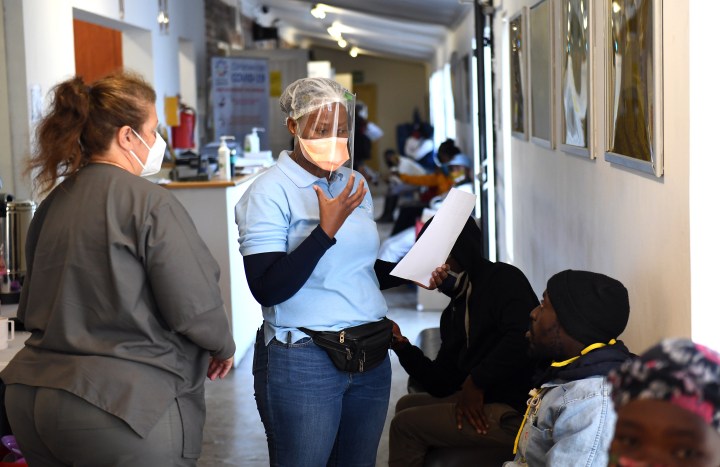
Financing is at the heart of ensuring Africa isn’t “left behind” in the COVID-19 vaccine race
Financing is at the heart of ensuring Africa isn’t “left behind” in the COVID-19 vaccine race

This week, the public-private GAVI vaccine alliance announced a new collaboration with Inida’s Serum Institute to make another 100 million doses of a coronavirus vaccine available to low- and middle-income nations.
Vaccine affordability is a big concern for some of those countries in Africa, and Wednesday, GAVI’s board is meeting to discuss further funding support measures it can unleash through its financing program called COVAX.
As part of Marketplace’s ongoing Fast Track coverage looking at the challenges of delivering a coronavirus vaccine to the world, Dr. Richard Mihigo, from the World Health Organization’s Regional Office for Africa, said he worries if there is not equal access to a vaccine, Africa will be left behind.
The following is an edited version of Mihigo’s conversation with the BBC’s Victoria Craig on the global edition of the “Marketplace Morning Report.”
Richard Mihigo: Beyond the issue of availability of a [COVID-19 vaccine], we know that the issue has been complicated by the fact that some of the developed countries are striking bilateral deals with vaccine manufacturers, which really also put at risk the equal distribution of the very few and scarce doses that will become available to people in Africa. So, the danger is that if the COVAX Facility mechanism is not successful enough to secure a necessary vaccine dose, Africa could potentially be left behind.
How to assure equal vaccine distribution
Victoria Craig: What process is in place at the moment to ensure distribution is as equal as it can be?
Mihigo: Most of the African countries have joined the COVAX Facility. It is the only platform that could guarantee access to the vaccine for them. But we know that through that platform, there are countries that need to self-finance the vaccine themselves. It’s quite an issue that many countries are struggling with. Beyond the financing aspect, there will be some other logistical components that need to be taken into consideration: the expansion of cold-chain capacity, the demand and acceptability of the vaccine itself in the communities to make sure that if the product is available, indeed, that the people are going to ask for and accept to be immunized.
Craig: On the issue of cold storage: Delivery companies have already warned about challenges and getting a vaccine that might need to be stored at a low temperature to some parts of the world, including in Africa. Is local production maybe a key to overcoming that challenge?
Mihigo: Well, it’s a bit complicated. We do have a few countries that have experience with the Ebola vaccine, which was also had to be stored in very, very low temperatures. So in the DRC, in Uganda, in Rwanda, South Sudan, all of those countries used the Ebola vaccine. We do hope that experience will help countries to build on whatever technology exists to scale up the COVID vaccine. But for other countries, indeed, there will be a need to expand the capacity of cold chain. With regard to local production capability, it’s potentially a solution for a long term. For the moment, there is no capacity on the African continent to do the vaccine production, at least using the new technologies that some of these vaccines are going to be produced through.
Overcoming logistical and misinformation challenges
Craig: Other vaccine programs in some parts of the continent this year have been put on hold because a number of logistical problems — a shortage of volunteers, even flights to get people to countries where they’re needed to carry out these programs. Are you worried about that becoming a problem for COVID-19 vaccine distribution?
Mihigo: The good news is that most countries have resumed their vaccination program. For the COVID-19 vaccine, definitely, [those logistical problems] might create some challenges. But I think the fact that most of the countries have started to resume their program, as well as the need to add additional resources through the revitalization of essential health services, could be something that could help at least to alleviate some of those concerns.
Craig: In many parts of the world, there are concerns about whether a final vaccine will be safe. That was a problem when it came to the polio vaccine in some places of Africa. Now Africa has been declared free of polio. So what programs are in place or what communication is in place to ensure that people will be able to get the vaccine and that they’ll be assured of its safety?
Mihigo: Safety is something that is at the center of WHO work, to make sure that countries can get access to safe and efficacious vaccines. We have seen a lot of misinformation. We are talking now about an “infodemic” around the vaccine the last couple of months. Misinformation has been amplified through the social media and I believe we need to get the right information to the people. The general public deserves the right information. The general public deserves to get all the reassurance and it will be definitely an important component of the COVID-19 vaccine deployment — that’s a robust communication strategy being implemented alongside a country preparing themselves to receive and deploy those vaccines in the near future.
There’s a lot happening in the world. Through it all, Marketplace is here for you.
You rely on Marketplace to break down the world’s events and tell you how it affects you in a fact-based, approachable way. We rely on your financial support to keep making that possible.
Your donation today powers the independent journalism that you rely on. For just $5/month, you can help sustain Marketplace so we can keep reporting on the things that matter to you.


















